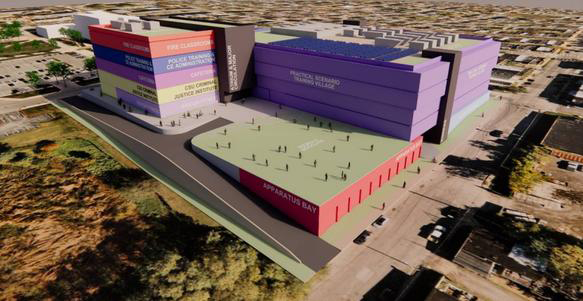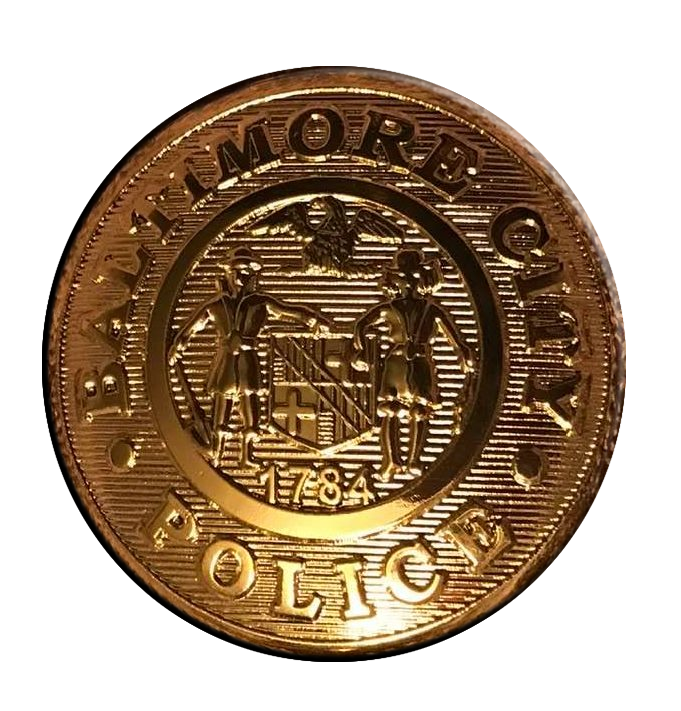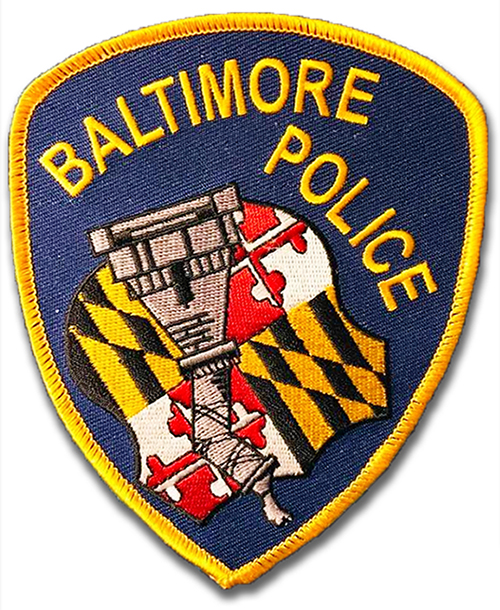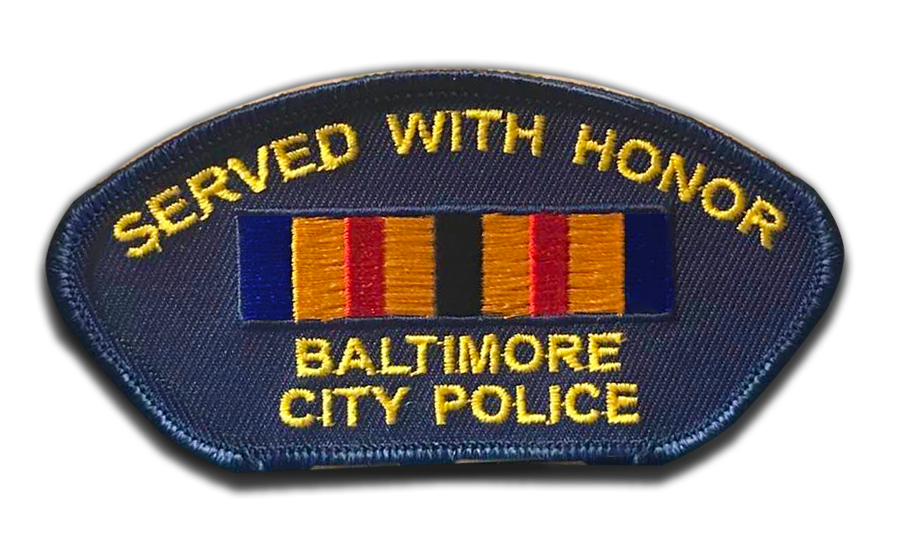 Proposed Baltimore police and fire training facility has a hefty price tag: $330 million
Proposed Baltimore police and fire training facility has a hefty price tag: $330 million
The Baltimore Banner - Justin Fenton and Ben Conarck - Published 8/25/2023 3:30 p.m. EDT, Updated 8/25/2023 4:14 p.m. EDT
A proposal for a new joint training facility for Baltimore’s police and fire departments on the Coppin State University campus has come back with a whopping price tag of $330 million.
A preliminary design report was posted to the Maryland Stadium Authority website Aug. 17, and it outlines two possible sites on the campus of the historically Black university in West Baltimore that would offer classroom and training space for the city’s two public safety agencies.
The Coppin project, pushed for nearly a decade and more formally explored starting in 2021, received renewed attention this week when a top Police Department official described it as a “tactical village,” drawing comparisons to the so-called “Cop City” project in Atlanta that has been the subject of protests.
But the controversial Atlanta project cost $90 million, a fraction of the proposed plans for the Baltimore facility. About $30 million of the Atlanta facility came from taxpayer funds, with the rest cobbled together from private donations.
Only $450,000 for the study has been expended thus far for the Coppin project. The design report addresses possible funding sources, including the suggestion of a possible “sunsetting public safety income tax” on residents. It also cites the Atlanta project as a “case study” in courting public support.
“The cost of this facility is a significant investment. However, the cost of doing nothing is exponentially more,” the report from architects Manns Woodward Studios concludes.
Gary McGuigan, an executive vice president with the Maryland Stadium Authority, said it was asked by Baltimore Mayor Brandon M. Scott to secure the project study and that it’s up to the city to figure out next steps.
“We put appropriate contingencies and escalation into these numbers, and, yeah, it’s a big number, but it’s a big building,” McGuigan said.
City Council President Nick Mosby has championed the project for nearly a decade. In a phone call Friday afternoon, Mosby reiterated his support for a police training facility in West Baltimore but declined to comment on the costs outlined by the Maryland Stadium Authority because he said he wasn’t familiar with the report.
Scott’s representatives could not be reached for comment Friday.
At Thursday’s quarterly meeting on the Baltimore Police consent decree, Deputy Commissioner Eric Melancon said officials are trying to determine funding sources. He described the project as a “tactical village,” which drew ire online.
Atlanta’s plans drew national attention and local protests, with activists saying the plans would further militarize police. Demonstrators occupied a campground on its site, and a protester was shot and killed by police as they moved in to make arrests. Other concerns include the destruction of forests to make way for the facility.
“Baltimore and Maryland leaders have seen all the controversy around Atlanta’s #StopCopCity and decided we need one too, at the expense of investing in prevention & roots causes of violence,” Nick Wilson, a former city public safety official now with the Center for American Progress, wrote on X, formerly known as Twitter.
Discussion of the Coppin facility dates to at least 2015, when Mosby, at the time a councilman representing West Baltimore, expressed a desire to see such a facility and sponsored a resolution calling for a feasibility study that passed easily through the council. Mosby said then that “a “state-of-the-art academy in West Baltimore that leverages Coppin’s current criminal justice school is a win-win situation.”
Then-Senate President Mike Miller and then-Mayor Catherine Pugh also threw their support behind it in 2018. “We’re working with Coppin State University because I’m going to double train police officers,” Pugh said while speaking at a community event. “I have got to have another training facility.”
U.S. District Judge James K. Bredar, who is overseeing the police consent decree reforms, also said in 2019 that building a new police training facility should be a top priority of city leaders and that the state should pitch in.
The Police Department training academy was located at a former school building just north of Pimlico Race Course. In 2019, amid discussion about moving the facility to Coppin, the city announced plans to relocate the academy to the University of Baltimore, at a cost of $6.8 million over five years, in addition to what The Baltimore Sun described at the time as “hundreds of thousands of dollars for parking and other fees associated with the move.”
Elected leaders including Antonio Hayes said at the time that they feared the University of Baltimore arrangement could come at the expense of the Coppin project, which he supported.
“It’s troubling to me, and it’s troubling to the community,” he said.
In May 2021, the Maryland Stadium Authority’s board of directors approved a memorandum of understanding to conduct a preliminary design of a new proposed Public Safety Building at Coppin State University.
Coppin State fully funded the design cost of $450,000 through a state grant. The stadium authority says the General Assembly has identified the new proposed Public Safety Building as a “priority project.”
Manns Woodward Studios won the contract to conduct the study in April 2022.
Their plan includes an indoor firing range and a “practical training village” that “combines the typical street widths found in Baltimore (alley, street, avenue) with the building typologies that the first responders will typically experience in Baltimore, such as two-story rowhomes, liquor stores, garden apartments, and a convenience store.”
“These buildings are modeled after real-world scenarios, enabling Fire and Police recruits to train independently and together,” the design plan says.
Also included is a community plaza where “local residents and university personnel can experience purposeful, positive interactions with first responders and alter preconceived perceptions.
“One of the significant challenges associated with this project will be to design an ‘Accessible Fortress’ that engages the community and keeps public safety personnel safe,” the study says.
Banner reporter Adam Willis contributed to this article.
This email address is being protected from spambots. You need JavaScript enabled to view it.

POLICE INFORMATION
If you have copies of: your Baltimore Police Department Class Photo, Pictures of our Officers, Vehicles, Equipment, Newspaper Articles relating to our department and or officers, Old Departmental Newsletters, Lookouts, Wanted Posters, and or Brochures. Information on Deceased Officers and anything that may help Preserve the History and Proud Traditions of this agency. Please contact Retired Detective Kenny Driscoll. This email address is being protected from spambots. You need JavaScript enabled to view it.

NOTICE
How to Dispose of Old Police Items
Please contact Det. Ret. Kenny Driscoll if you have any pictures of you or your family members and wish them remembered here on this tribute site to Honor the fine men and women who have served with Honor and Distinction at the Baltimore Police Department. Anyone with information, photographs, memorabilia, or other "Baltimore City Police" items can contact Ret. Det. Kenny Driscoll at This email address is being protected from spambots. You need JavaScript enabled to view it. follow us on Twitter @BaltoPoliceHist or like us on Facebook or mail pics to 8138 Dundalk Ave. Baltimore Md. 21222
Copyright © 2002 Baltimore City Police History - Ret Det Kenny Driscoll


 Proposed Baltimore police and fire training facility has a hefty price tag: $330 million
Proposed Baltimore police and fire training facility has a hefty price tag: $330 million















